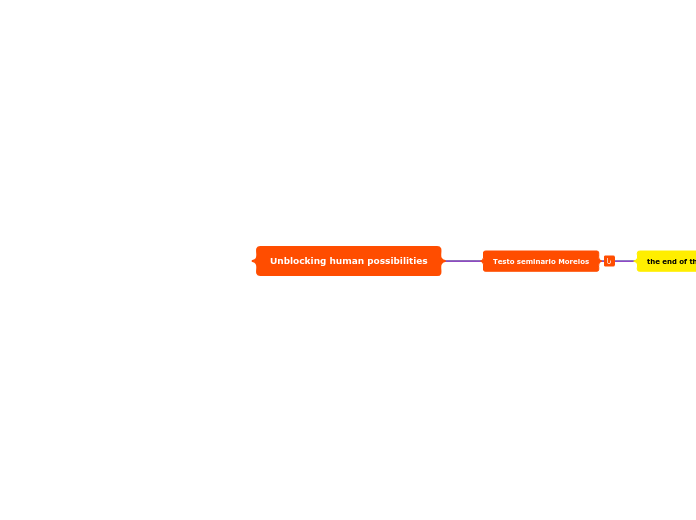Unblocking human possibilities
Testo seminario Morelos
the end of the idea of progress
ThereIsNoAlternative
market or bureaucracy (Utopia, c.1)
(oddly remembers Turgot)
The war on imagination
we are, and we have always been, creative beings able to reinvent ourselves
(DoE)
we are stuck because we believe we are, but this belief is the result of a specific ideological construction
Nowadays, most of us find it increasingly difficult even to picture what an alternative economic or social order would be like. Our distant ancestors seem, by contrast, to have moved regularly back and forth between them.
If something did go terribly wrong in human history – and given the current state of the world, it’s hard to deny something did – then perhaps it began to go wrong precisely when people started losing that freedom to imagine and enact other forms of social existence, to such a degree that some now feel this particular type of freedom hardly even existed, or was barely exercised, for the greater part of human history.
It means we could have been living under radically different conceptions of what human society is actually about. It means that mass enslavement, genocide, prison camps, even patriarchy or regimes of wage labour never had to happen. But on the other hand it also suggests that, even now, the possibilities for human intervention are far greater than we’re inclined to think
#DoE, conclusion, p. 502
(Introduction to Mutual Aid)
Circular argument: why people dance?
What's the point, if we can't have fun?
Hopelessness isn’t natural. It needs to be produced. If we really want to understand this situation, we have to begin by understanding that the last thirty years have seen the construction of
a vast bureaucratic apparatus for the creation and maintenance of hopelessness, a kind of giant
machine that is designed, first and foremost, to destroy any sense of possible alternative futures
use of anthropology: show possibilities, dispel the myths
show that there are different ways
(Possibilities)
asking big questions, the great tradition
escaping the colonialist traps of the great tradition, and evolution too
#Mauss: almost all social possibilities—democracy and monarchy, individualism and communism, gifts and money—are simultaneously present in any social context, and always have been, and that all that really varies from age to age is how they come together, and which tend to be seized on and promoted over the others as the truly defining features of society or human nature.
instead of stages of history being based on opposed principles, everything exists at once: gifts, commodities, patronage, exploitation. It is a question of emphasis and articulation.
Use of anthropology: anthropological
appraisal of our culture
our current predicament is not universal (its universality has been built by violence), it is historically placed
going back to Max Weber’s question: what is so peculiar about the West that here, and only here, was developed this peculiar form of rationality that now shapes what we understand as science, reason, and universal values?
DoE - what MW "protestant ethics" is really about
what's specific of European civilization:
property (Roman Law notion of)
equality
Different societies sometimes have radically different systems of value, and what might be most important in one – or at least, what everyone insists is most important in one – might have very little to do with what’s important in another. Imagine a society in which everyone is equal before the gods, but 50 per cent of the population are sharecroppers with no property and therefore no legal or political rights. Does it really make sense to call this an ‘egalitarian society’ – even if everyone, including the sharecroppers, insists that it’s really only one’s relation to the gods that is ultimately important? There’s only one way out of this dilemma: to create some sort of universal, objective standards by which to measure equality. Since the time of Jean-Jacques Rousseau and Adam Smith, this has almost invariably meant focusing on #property arrangements.
freedom
individual freedom as private #property DoE 66-7
#possessive_individualism
Possibilities: the transition from the world of Rabelais to that of Queen Victoria, Elias' manners, puritan and controriformist war on popular culture are part of the same historical process that led to absolute private property and commercialization of everyday life
with its reductionist view of what is "material" (reducing material to exchange value), marxism is in the same frame (Max Weber:
Turning modes of production ...
All economies are ultimately human economies
European notion of equality
violence and imagination
imagination as a repository of possibilities
Fragments
imagination and building a new social order
Utopia
violence as cutting out complexity - the same logic as avoidance
Utopia: violence and stupidity
Kairos
it is quite clear, now, why Rousseau couldn't understand Kandiarok's idea of freedom: property (C.B. MacPherson,The Political Theory of Possessive Individualism: From Hobbes to Locke, Oxford UP 1962)
and why the European answer to the Indigenous' critique's challenge was to reduce everything to the means of production
Far from being the dead end of human civilization, our times are a Kairos, one of these moments of great historical transformation where what we do makes the most difference5. If a Dawn of Everything has ever existed, it is now, not in a remote foundational past that cannot anymore be changed or redeemed.
Hope, in BBC podcast
DoE, conclusions
all possibilities are always present, but following the circumstancies and, above all, the #self-conscious choices of a group or a civilization, some are prevalent (elaborate / find out how it works)
how does a civilzation decide? Imagination, conversation ... dispel the myth of the Great Man
revolution (Fragments)
how state and capital appropriate social creativity and social bureaucracy:
communism (Utopia)
bureaucracy (DoE ch. 10)
take back our social creativity
western rationality as described by Max Weber is, in fact, a form of stupidity - or, better said, of violent reduction of complexity
Benjamin's critique of violence: negotiation and "pure means" vs Gewalt
Marianella Sclavi
